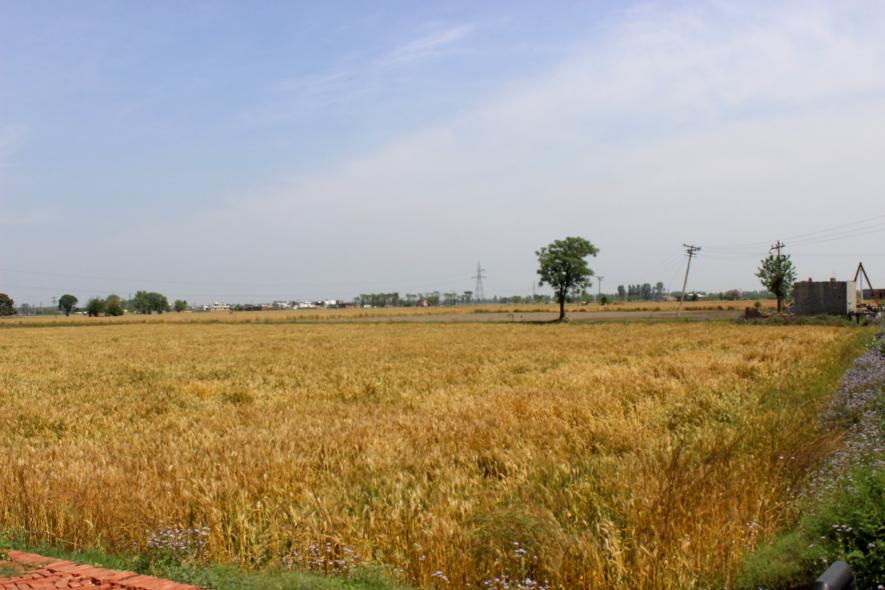Haryana Set to Dilute Land Acquisition Rules Allegedly to Benefit Corporates

New Delhi: The Manohar Lal Khattar-led Bharatiya Janata Party government of Haryana has passed a Bill aimed at ‘diluting’ land acquisition rules in the state, allegedly to benefit the corporate sector, despite firm resistance by the opposition Congress party. The Right to Fair Compensation and Transparency in Land Acquisition, Rehabilitation and Resettlement (Haryana Amendment) Bill 2021, which was passed by the Haryana Assembly on August 24, is now pending assent from President Droupadi Murmu.
The Bill was passed amid a walkout by Congress MLAs in the Haryana legislative Assembly, who alleged that its provisions were detrimental to the interest of land owners and farm workers. Congress has demanded the examination of the Bill by a select committee of the Assembly before it is finalised into an Act.
At the same time, civil society activists have alleged that the Bill completely overrides the provisions of the Right to Fair Compensation and Transparency in Land Acquisition, Rehabilitation and Resettlement Act, 2013 – popularly known as the LARR Act – which was enacted by the Congress-led United Progressive Alliance government at the Centre after numerous mass struggles, spreading over decades, against forcible takeover of land.
“The Bill seems to defeat the very purpose based on which the LARR Act was formulated in 2013. It does away with mandatory social impact assessment studies for several projects which is an anti-people measure. The provision to conduct social impact assessments before the land takeover was included in the Act after a long and continuous struggle. Easing restrictions imposed on the takeover of multi-cropped land will result in large-scale rural unemployment and is also likely to cause food shortage. Avoiding the acquisition of multi-cropped land is an arrangement that was put in place, at the time of enacting the LARR Act, to ensure food security in the country,” Rebbapragada Ravi, Executive Director of NGO Samata and Chairperson of mines, minerals, and PEOPLE, an alliance of individuals and communities affected by mining, told this reporter.
The Bill has been termed ‘unconstitutional’, too, since it overrides the provisions of the principal Act. Through the Bill, the Haryana government has exempted the provision contained in the LARR Act, 2013, to mandatorily determine beforehand the social impact of several projects, and whether it is indeed for a public purpose, before giving it the nod for land acquisition.
The state government also proposed to do away with the emphasis of the principal Act to avoid, to the farthest extent possible, the acquisition of “multi-cropped land”. The aforementioned provisions are contained in Chapters II and III, respectively, of the LARR Act, 2013.
Chapter II of the LARR Act, 2013 provides for a two-step process of social impact assessment. The first step is a preliminary investigation to determine the social impact of a particular project and assess if it is indeed for public purpose. This step includes public hearings of project-affected families and individuals and publication of the social impact assessment study, after it is prepared, on various forums and platforms.
The second step comprises an appraisal of the social impact assessment study through a government-appointed independent, multi-disciplinary expert group. The final recommendation for land acquisition, thereafter, is subject to the opinion of the expert group as to whether the project will indeed serve any public purpose and if the potential benefits of the project will outweigh its social costs and adverse social impacts.
Chapter III of the LARR Act, 2013, pertains to the safeguarding of food security of the country while acquiring land. The chapter lays down a rule that irrigated multi-cropped land is to be acquired only “under exceptional circumstances, as a demonstrable last resort”. In addition, wherever irrigated multi-cropped land is acquired, an equivalent parcel has to be mandatorily brought under agriculture. Alternatively, a sum of money equivalent to the value of the multi-cropped land acquired has to be deposited with the concerned state government for putting in use for agricultural activities to ensure food security.
As per the provisions of the Bill, several infrastructure projects in different sectors – transport, energy, water and sanitation, communication, and social and commercial infrastructure – will be exempted from the purview of Chapters II and III. This includes projects undertaken in public-private partnership (PPP) mode where ownership of land continues to remain with the government.
Projects considered “vital to national security or defence of India” will be exempted from the purview of the aforementioned Chapters, including those about “defence production”, a sector that has been opened up to the private sector by the Narendra Modi government. Land acquired for up to 2 kilometres on either side of a road or railway line in “industrial corridors” will find exemption too, going by these Chapters.
Affordable housing projects and projects meant for housing of the poor will be exempted. Exemption will also be made for housing projects meant for rehabilitating project-displaced families and families that have lost their shelters owing to natural calamities. Acquisition of land – even multi-cropped land – can take place for metro and rapid rail projects without even conducting any social impact assessment, as per the Bill.
Congress has alleged that exempting infrastructure projects undertaken in PPP mode is tantamount to weakening the rigours of land acquisition for the corporate sector and allowing private industries to acquire land with ease through a backdoor method. Kiran Choudhry, senior Congress leader and MLA from Tosham Assembly constituency, has written to Murmu, urging her not to sign the Bill and return it to the Assembly in its present form.
“The sole purpose of this proposed amendment seems to be to throw lush and prime agriculture land open to acquisition by big corporate players, waiving the safeguards in the benign principal Act,” Choudhry has written, as per reports.
The Bill empowers the Haryana government to allow the aforementioned exemptions on grounds of “public interest”, a term which is neither defined in the Bill nor contained in the principal Act, she adds.
“The Bill had been hastily piloted and approved in a short period of Haryana Vidhan Sabha’s August 2021 session, ignoring our vociferous protests and a walkout; understandably any meaningful discussion was stifled and steamrolled, and due deliberations were eschewed,” Choudhry has further mentioned in her letter.
The Haryana government has inserted a provision in the Bill, which as per the Congress party, will allow skipping off the due process contained in the principal Act to obtain the prior consent of all stakeholders before acquiring land. This provision (numbered 4 in the Bill) allows a District Collector to declare land acquisition proceedings as having been completed without even conducting any inquiries if “all the persons interested in the land who appeared before him” agree with their “free will and consent” for the takeover. Congress has termed this provision as “draconian” and contrary to the “principles of natural justice and fair play” because it will allow a District Collector to announce an award for acquisition without conducting a spot visit or inquiry.
The Bill also does with the provision of the principal Act whereby at least 48 hours is allowed for shifting moveable properties out of houses and buildings – even privately owned – that are sought to be taken over urgently for matters of national security or in case of natural calamities.
Further, another provision (numbered 5 in the Bill) empowers the Haryana government to limit the amount of money that is paid to project-affected families for rehabilitation and resettlement along with compensation. The rehabilitation and resettlement amount, which will be paid in a lumpsum, can be restricted to only 50% of the compensation amount finalised against the land that would be acquired. This provision comes into play whenever the state government acquires a parcel of land measuring less than 200 acres for its use.
In the gazette notification through which the amendment Bill was published by the Haryana government in August 2021, no justification whatsoever was given for the proposed change in rules of land acquisition, as contained in the principal Act. When contacted, Haryana’s Financial Commissioner (Revenue) Varinder Singh Kundu recused himself from issuing any statement on the gazette notification saying that he joined the department only about a week ago.
However, the BJP-led government has been firmly backing the changes. During a discussion on the Bill in the Assembly on August 24, Haryana’s Deputy Chief Minister Dushyant Chautala of the Jannayak Janata Party, who is also in charge of the state’s revenue department, claimed that the amendments would speed up public projects as land acquisition would become smooth and hassle-free. He asserted that 16 states across the country had already amended the LARR Act following their own, respective, local conditions.
The State government believes that the amendments have been formulated to expedite development projects by simplifying the procedure for the acquisition of land. However, the Opposition Congress and civil society activists have flagged serious concerns.
The writer is an independent journalist.
Get the latest reports & analysis with people's perspective on Protests, movements & deep analytical videos, discussions of the current affairs in your Telegram app. Subscribe to NewsClick's Telegram channel & get Real-Time updates on stories, as they get published on our website.
























